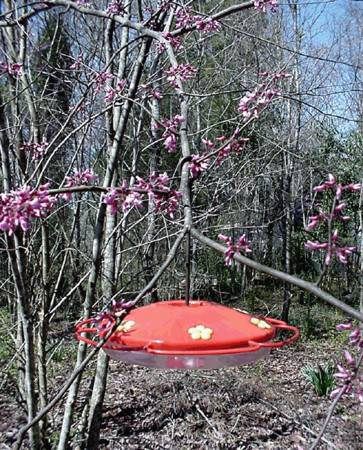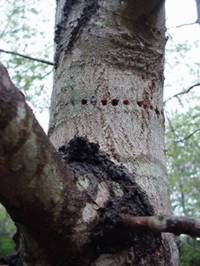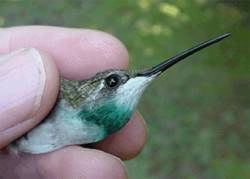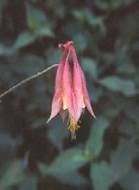|
|
|||
|
THIS WEEK at HILTON POND |
|
The Hummers are Coming! For the past week or so, correspondents in Louisiana have been burning up the Internet with news that migrating Ruby-throated Hummingbirds have arrived in several states along the Gulf of Mexico. Some of these "early birds" may linger a bit longer at their current locations, perhaps because moderate temperatures there allow nectar-laden blossoms well before major blooms further north. However, there are two reports of hummingbirds already in North Carolina on 19 March, so--to belabor the obvious--it's time to get your feeders up! 
All photos © Hilton Pond Center The earliest Ruby-throated Hummingbird here at Hilton Pond Center was an adult male banded on 27 March 1991; he was a week ahead of our next earliest hummer, but our feeders have been ready and waiting, including one in a Redbud tree (above). We have two bird-related rules of thumb: new bluebird boxes are in place by St. Valentine's Day (14 February), and at least one hummingbird feeder is hung by St. Patrick's Day (17 March). If--in the highly competitive sports of attracting bluebirds and feeding hummingbirds--you want neighborhood bragging rights because YOU have the first ruby-throat or earliest bluebird eggs of the year, you may want to heed the suggested dates above. We've heard many times how a homeowner forgot to hang her hummingbird feeder in spring and looked out the window to see a bird hovering in the very same spot where the feeder was last season. There's no doubt that hummingbirds remember from year to year where "free lunch" can be had, and you certainly don't want to "disappoint" your expectant visitors by waiting until June to put up your feeders. (NOTE: The 17 March date works well for hummingbird feeding in the Carolina Piedmont. If you live in coastal areas or further south, you might want your feeders up a week or so earlier; if in the mountains or further north, perhaps a week later.) Ruby-throated Hummingbirds that migrate too early in spring do run the risk of arriving before most flowers blossom, The bottom line here is that a newly arrived hummingbird probably doesn't "need" our sugar water feeders; One other thing. Numbers of hummingbirds visiting in early spring will be low, so the sugar water level in your feeders will go down slowly. While you're waiting for your backyard hummers to arrive, shake the cobwebs off your garden tools and put some hummingbird flowers in the ground. For lists of our "Top Ten" hummingbird plants--such as spring-blooming Red Columbine (right)--plus tons of good advice about feeding hummers, visit the Web site for "Operation RubyThroat: The Hummingbird Project" at www.rubythroat.org. You'll especially want to check out the main section on "Attracting & Feeding Hummingbirds." To report color-marked Ruby-throated Hummingbirds from Hilton Pomd Center--or just to let us know what day you first get hummers this spring--send an e-mail to RESEARCH. Happy Hummingbird Watching! If you enjoy "This Week at Hilton Pond," please help Support Hilton Pond Center for Piedmont Natural History |

 but these birds still know a way to get their sugar fix. At Hilton Pond Center, Yellow- bellied Sapsuckers have been hammering for months on a Sugar Maple (Acer saccharum), making horizontal rows of holes (right) that ooze the sap from which this northern woodpecker gets its name. As pancake-loving humans know, maple sap is loaded with sugar, so it's not surprising that hummingbirds visit these "sapsucker wells," sampling not only sweet tree sap but also tiny protein- and fat-rich insects that are likewise attracted. What a deal! One-stop shopping at a sapsucker well gives a hummingbird carbohydrates for quick energy, fats for longer-term use, and proteins to help repair and replenish flight muscles used during that long spring migration.
but these birds still know a way to get their sugar fix. At Hilton Pond Center, Yellow- bellied Sapsuckers have been hammering for months on a Sugar Maple (Acer saccharum), making horizontal rows of holes (right) that ooze the sap from which this northern woodpecker gets its name. As pancake-loving humans know, maple sap is loaded with sugar, so it's not surprising that hummingbirds visit these "sapsucker wells," sampling not only sweet tree sap but also tiny protein- and fat-rich insects that are likewise attracted. What a deal! One-stop shopping at a sapsucker well gives a hummingbird carbohydrates for quick energy, fats for longer-term use, and proteins to help repair and replenish flight muscles used during that long spring migration. even in early spring there are varieties of natural foods out there for the taking. Nonetheless, having a feeder at your window brings the hummer in for closer viewing, and you never know when that might help you see a Ruby- throated Hummingbird with a distinctive GREEN necklace (left). If you do, you'll know the bird was captured, banded, and marked with non-toxic dye as it passed through Hilton Pond Center on its way north, and we hope you'll let us know about your sighting. (Details about the Center's hummingbird banding and color-marking protocols are at
even in early spring there are varieties of natural foods out there for the taking. Nonetheless, having a feeder at your window brings the hummer in for closer viewing, and you never know when that might help you see a Ruby- throated Hummingbird with a distinctive GREEN necklace (left). If you do, you'll know the bird was captured, banded, and marked with non-toxic dye as it passed through Hilton Pond Center on its way north, and we hope you'll let us know about your sighting. (Details about the Center's hummingbird banding and color-marking protocols are at  It will still ferment, so only fill your feeders halfway and change the mix weekly through March and early April; when temperatures rise, replace uneaten sugar water at least every third day.
It will still ferment, so only fill your feeders halfway and change the mix weekly through March and early April; when temperatures rise, replace uneaten sugar water at least every third day.
